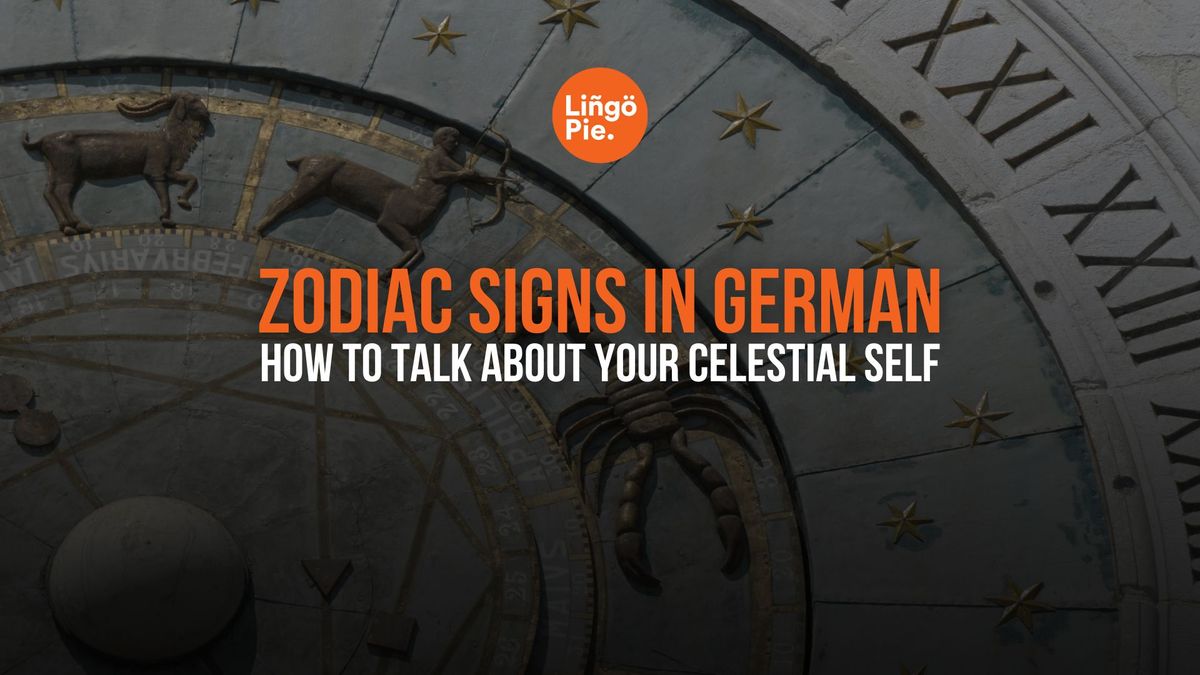Ever been to a new country and didn't know what to say? That's what happened to me in Germany. I went there for a work trip and was scared about talking to new people in the German language. Then I had an idea – why not chat about zodiac signs?
The result? I had a blast!
In this post, we'll learn about zodiac signs in German. Whether you're going to Germany or just want to learn something new, this can help you make friends and understand German culture better. Let's learn about "Sternzeichen" (that's German for star signs) together!
Interested in more zodiac-related content? Read these posts!
- 12 Zodiac Signs In French: How To Talk About Your Sign
- 12 Zodiac Signs In Japanese: How To Talk About Horoscopes
- 12 Zodiac Signs In Spanish: How To Talk About Astrology
How to Ask "What's Your Zodiac Sign?" in German
To ask "What's your zodiac sign?" in German, you can say "Was ist dein Sternzeichen?" This is the most common and straightforward way to ask about someone's zodiac sign in an informal setting.
If you're in a more formal situation or speaking to someone older or in a position of authority, you can use the polite form: "Was ist Ihr Sternzeichen?" Both phrases literally translate to "What is your star sign?" in English.
Looking for some variations? Of course, I got you covered! Here are my favorites!
| German | English | Pronunciation |
|---|---|---|
| Welches Sternzeichen hast du? | What zodiac sign do you have? | Vel-ches shtern-tsai-shen hast du? |
| In welchem Monat bist du geboren? | In which month were you born? | In vel-chem mo-nat bist du ge-bo-ren? |
| Wann hast du Geburtstag? | When is your birthday? | Van hast du ge-burts-tag? |
Is it common to talk about zodiac signs in Germany? Well, it's not an everyday topic, but many Germans know their sign and might chat about it for fun. It's more popular among younger people and can be a good ice-breaker at parties or casual meet-ups.
Just remember, not everyone takes it seriously, so it's best to keep the conversation light and fun!

12 Zodiac Signs In German
Just like in English, German has names for all 12 zodiac signs. These names are often similar to the English ones, as they come from the same Latin roots. However, the German pronunciation might be a bit different. Let's take a look at all the zodiac signs, along with their English names and literal translations.
| English | German | Translation |
|---|---|---|
| Aries | Widder | Ram |
| Taurus | Stier | Bull |
| Gemini | Zwillinge | Twins |
| Cancer | Krebs | Crab |
| Leo | Löwe | Lion |
| Virgo | Jungfrau | Virgin |
| Libra | Waage | Scale |
| Scorpio | Skorpion | Scorpion |
| Sagittarius | Schütze | Archer |
| Capricorn | Steinbock | Stone Buck (Mountain Goat) |
| Aquarius | Wassermann | Water Man |
| Pisces | Fische | Fish |
Now, let's explore each zodiac sign individually, specifically into their significance in German culture and the characteristics associated with people under each.
Widder (Aries - ♈)
Pronunciation: VID-der (The 'w' sounds like a 'v', and the 'er' at the end is pronounced more like 'uh')
Widder is known for being one of the most energisch (energetic) and mutig (courageous) signs of the German zodiac. People born under this sign are often described as selbstbewusst (self-confident) and ehrgeizig (ambitious), with a natural talent for leadership or Führungsqualitäten. Widder individuals are typically spontan (spontaneous) and abenteuerlustig (adventurous), always ready to take on new challenges.
In German astrology, Widder is associated with Durchsetzungsvermögen (assertiveness) and Pioniergeist (pioneering spirit). They have a reputation for being entschlossen (determined) in their pursuits, but can also be ungeduldig (impatient) at times.
Sample sentences:
- Widder-Geborene sind oft sehr energisch und mutig. (Widder-born individuals are often very energetic and courageous.)
- Meine Freundin ist ein Widder und sie ist sehr selbstbewusst und ehrgeizig. (My girlfriend is an Aries and she is very self-confident and ambitious.)

Stier (Taurus - ♉)
Pronunciation: SHTEER (The 'St' sounds like 'sht', and the 'ie' is pronounced like a long 'ee')
Meet the Stier - the steady rock of the German zodiac! These folks are as zuverlässig (reliable) as they come, with a stubborn streak a mile wide. Stier people are all about the good life, loving their Komfort (comfort) and Genuss (enjoyment). They're not just lazy couch potatoes though - Stiers are known for their Ausdauer (endurance) and ability to work hard for what they want.
In Germany, calling someone a "sturdy ox" isn't an insult - it's a compliment! The phrase "stark wie ein Stier" (strong as a bull) is commonly used to describe someone's strength, both physical and mental. Stiers are often seen as great friends and partners due to their loyal and patient nature.
However, be careful not to push them too far - when angered, they can be as stubborn as their celestial animal!
Try these phrases:
- Der Stier liebt gutes Essen und schöne Dinge. (The Taurus loves good food and beautiful things.)
- Mein Kollege ist ein typischer Stier - zuverlässig, aber manchmal stur. (My colleague is a typical Taurus - reliable, but sometimes stubborn.)
Zwillinge (Gemini - ♊)
Pronunciation: TSVIL-ing-uh (The 'Zw' sounds like 'tsv', and the final 'e' is a short 'uh' sound)
Zwillinge, oh Zwillinge! These chatty twins of the zodiac are known for being gesprächig (talkative) and vielseitig (versatile). If you meet a Zwillinge, get ready for a whirlwind of ideas and non-stop chatter! They're the Alleskönner (jack-of-all-trades) of the star signs, always eager to learn and try new things. Their Neugier (curiosity) is as boundless as their energy.
In German culture, Zwillinge are often associated with quick wit and adaptability. There's a saying, "Zwei Seelen wohnen, ach! in meiner Brust" (Two souls, alas, dwell in my breast) from Goethe's Faust, which seems tailor-made for the dual nature of Gemini.
While their flexibility is admired, Germans might also use the phrase "wie ein Fähnchen im Wind" (like a little flag in the wind) to describe their sometimes inconsistent nature.
Give these sentences a go:
- Zwillinge sind oft sehr kommunikativ und anpassungsfähig. (Geminis are often very communicative and adaptable.)
- Mein Bruder ist ein typischer Zwilling - er kann stundenlang reden! (My brother is a typical Gemini - he can talk for hours!)
Krebs (Cancer - ♋)
Pronunciation: KREPS (The 'r' is slightly rolled, and the final 's' sounds like 'ss')
These water signs are known for being fürsorglich (caring) and einfühlsam (empathetic). If you've got a Krebs in your life, consider yourself lucky - they've probably got your back! These folks are all about Geborgenheit (security and comfort), both for themselves and their loved ones. They're often häuslich (home-loving) and have a knack for making any place feel cozy.
In German culture, the Krebs is sometimes associated with being launisch (moody) - much like the changing tides they're connected to. There's a cute German saying that fits the Krebs perfectly: "Einen Krebs kann man nicht vorwärts laufen lehren" (You can't teach a crab to walk forwards). This refers to their tendency to approach things indirectly, but also their strong connection to the past and tradition.
Try out these Krebs-related sentences:
- Krebse sind oft sehr familienorientiert und beschützend. (Cancers are often very family-oriented and protective.)
- Meine Tante ist ein Krebs und sie kocht die besten Familienessen. (My aunt is a Cancer and she cooks the best family meals.)

Löwe (Leo - ♌)
Pronunciation: LER-vuh (The 'ö' sounds like the 'er' in "her", and the final 'e' is a short 'uh' sound)
These fiery signs are as selbstbewusst (self-confident) as they come, with a Charisma that can light up any room. Löwen are natural born leaders, or Anführer as we say in German. They've got a flair for the dramatic and love being in the Rampenlicht (spotlight). If you've got a Löwe friend, you know they're always up for a bit of Spaß (fun) and Abenteuer (adventure).
In German culture, the phrase "stolz wie ein Löwe" (proud as a lion) is often used to describe someone with great dignity and pride - fitting for our Leo friends! However, Germans might also teasingly use "eine Löwenmähne" (a lion's mane) to describe someone with big, wild hair - a nod to Leo's love of looking fabulous.
Give these roar-some sentences a try:
- Löwen stehen gerne im Mittelpunkt und lieben es, bewundert zu werden. (Leos like to be the center of attention and love to be admired.)
- Mein Chef ist ein typischer Löwe - charismatisch und immer bereit, die Führung zu übernehmen. (My boss is a typical Leo - charismatic and always ready to take the lead.)
Jungfrau (Virgo - ♍)
Pronunciation: YOONG-frow (The 'J' sounds like 'Y', and 'au' is pronounced like 'ow' in "cow")
These earth signs are known for being ordentlich (neat) and zuverlässig (reliable). If you need someone to Ordnung schaffen (create order) in your life, call a Jungfrau! They're the Detailverliebten (detail-lovers) of the star signs, always striving for Perfektion (perfection) in everything they do. Their analytisches Denken (analytical thinking) is second to none.
While some might find their perfectionism a bit much, most appreciate the Jungfrau's ability to keep things running smoothly. After all, in a culture that values Gründlichkeit (thoroughness), Virgos fit right in!
Try these tadellos (flawless) sentences:
- Jungfrauen sind oft sehr organisiert und haben ein Auge fürs Detail. (Virgos are often very organized and have an eye for detail.)
- Meine Schwester ist eine typische Jungfrau - ihr Zimmer ist immer blitzblank! (My sister is a typical Virgo - her room is always spotless!)
Waage (Libra - ♎)
Pronunciation: VAA-guh (The 'W' sounds like 'V', and the final 'e' is a short 'uh' sound)
These air signs are all about Harmonie (harmony) and Gerechtigkeit (justice). If you're looking for a Friedensstifter (peacemaker) in your group, chances are it's a Waage!
They're known for being diplomatisch (diplomatic) and have a knack for seeing all sides of an issue. Waage folks are often charmant (charming) and gesellig (sociable), making them great company at any Zusammenkunft (gathering).
In German culture, the Waage's indecisiveness is sometimes playfully referred to as "Auf der Kippe stehen" (to be on the brink), reflecting their constant weighing of options.
Balance these sentences:
- Waagen streben immer nach Ausgewogenheit in allen Lebensbereichen. (Libras always strive for balance in all areas of life.)
- Mein bester Freund ist eine Waage - er ist der perfekte Vermittler bei Streitigkeiten. (My best friend is a Libra - he's the perfect mediator in disputes.)
Skorpion (Scorpio - ♏)
Pronunciation: skor-pee-ON (The stress is on the last syllable, and the 'i' is pronounced like 'ee')
If you want someone who can see right through you, it's a Skorpion! They're the Geheimniskrämer (keepers of secrets) of the star signs, with an uncanny ability to uncover what's hidden. Skorpione are often described as magnetisch (magnetic) and entschlossen (determined).
While some might find them intimidating, those close to a Skorpion know they have a Herz aus Gold (heart of gold) beneath their tough exterior.
Sting these sentences into your conversation:
- Skorpione sind oft sehr intuitiv und haben einen durchdringenden Blick. (Scorpios are often very intuitive and have a penetrating gaze.)
- Meine Kollegin ist ein typischer Skorpion - sie gibt nie auf, bis sie die Wahrheit herausgefunden hat. (My colleague is a typical Scorpio - she never gives up until she's uncovered the truth.)
Schütze (Sagittarius - ♐)
Pronunciation: SHOO-tse (The 'ü' sounds like 'oo' in "shoot", and the final 'e' is a short 'uh' sound)
If you're looking for someone to go on a spontaneous Abenteuer (adventure) with, call a Schütze! They're the Weltenbummler (globetrotters) of the star signs, always eager to explore new horizons. Schützen are often aufgeschlossen (open-minded) and have a great sense of humor.
In German culture, the Schütze's love for freedom and honesty is admired, though sometimes their bluntness can be a bit much. There's a saying that fits them perfectly: "Mit der Tür ins Haus fallen" (to fall into the house with the door), which means to be very direct or abrupt.
Aim these sentences at your next conversation:
- Schützen sind oft sehr optimistisch und lieben es, neue Dinge zu entdecken. (Sagittarians are often very optimistic and love discovering new things.)
- Mein Bruder ist ein typischer Schütze - er plant gerade seine nächste Weltreise! (My brother is a typical Sagittarius - he's already planning his next world trip!)

Steinbock (Capricorn - ♑)
Pronunciation: SHTINE-bok (The 'ei' sounds like 'i' in "fine", and the 'o' is short)
If you need someone to Verantwortung übernehmen (take responsibility), look no further than a Steinbock! They're the Arbeitstiere (workaholics) of the star signs, always striving to reach new heights. No wonder why steinböckes are often described as verlässlich (reliable) and ausdauernd (persistent)!
Steinböcke sind oft sehr ehrgeizig und haben langfristige Ziele. (Capricorns are often very ambitious and have long-term goals.)
- Meine Chefin ist ein typischer Steinbock - sie arbeitet hart und erwartet das Gleiche von anderen. (My boss is a typical Capricorn - she works hard and expects the same from others.)
Wassermann (Aquarius - ♒)
Pronunciation: VAH-ser-man (The 'W' sounds like 'V', and the 'er' is pronounced like 'uh')
These air signs are known for being originell (original) and unkonventionell (unconventional). If you're looking for someone to come up with verrückte Ideen (crazy ideas), a Wassermann is your go-to person!
They're the Querdenker (out-of-the-box thinkers) of the star signs, always ready to challenge the status quo. Wassermänner are often idealistisch (idealistic) and have a strong sense of Gemeinschaftssinn (community spirit).
Pour these sentences into your next German conversation:
- Wassermänner sind oft sehr kreativ und haben innovative Lösungen für Probleme. (Aquarians are often very creative and have innovative solutions for problems.)
- Mein Mitbewohner ist ein typischer Wassermann - er hat immer die ausgefallensten Ideen für unsere WG-Partys. (My roommate is a typical Aquarius - he always has the most unusual ideas for our apartment parties.)
Fische (Pisces - ♓)
Pronunciation: FI-shuh (The 'i' sounds like 'ee' in "feed", and the final 'e' is a short 'uh' sound)
If you need someone to in deine Seele blicken (look into your soul), a Fische is your best bet! Why? Well Fische are typically mitfühlend (compassionate) and have a strong künstlerische Ader (artistic vein).
There's a saying that fits them perfectly: "Zwei Seelen wohnen, ach! in meiner Brust" (Two souls, alas, reside in my chest) - a nod to their dual nature and ability to adapt to different situations.
Swim these sentences into your German vocabulary:
- Fische sind oft sehr kreativ und haben ein ausgeprägtes Gespür für die Gefühle anderer. (Pisces are often very creative and have a strong sense for others' feelings.)
- Meine beste Freundin ist ein typischer Fisch - sie kann stundenlang malen und Musik machen. (My best friend is a typical Pisces - she can paint and make music for hours.)

Talking About Zodiac Signs in German
Whether you're chatting at a café or mingling at a party, knowing how to talk about star signs in German can add an interesting dimension to your small talk. Let's explore how to ask about, share, and discuss zodiac signs in German in this section.
Asking About Someone's Zodiac Sign
When asking these questions, remember to use the appropriate form (du or Sie) based on your relationship with the person. The "du" form is for informal situations with friends or peers, while "Sie" is for formal situations or with people you don't know well.
| German | English | Usage |
|---|---|---|
| Was ist dein Sternzeichen? | What's your zodiac sign? | Informal |
| Was ist Ihr Sternzeichen? | What's your zodiac sign? | Formal |
| Unter welchem Sternzeichen bist du geboren? | Under which star sign were you born? | Informal, casual |
| In welchem Monat hast du Geburtstag? | In which month is your birthday? | Informal, indirect |
Sharing Your Own Zodiac Sign
Once someone has asked about your zodiac sign, you'll want to know how to respond. You can choose to directly state your sign or mention your birth month, which indirectly reveals your sign.
| German | English | Usage |
|---|---|---|
| Ich bin [Sternzeichen]. | I am [zodiac sign]. | Direct statement |
| Mein Sternzeichen ist [Sternzeichen]. | My zodiac sign is [zodiac sign]. | Alternative direct statement |
| Ich habe im [Monat] Geburtstag. | My birthday is in [month]. | Indirect, stating birth month |
Discussing Zodiac Sign Traits
Once you've established someone's zodiac sign, you might want to discuss the traits associated with it. This can lead to interesting conversations about personality and characteristics.
These phrases below will allow you to comment on typical traits of zodiac signs. Remember, these are generalizations and should be used in a light-hearted manner.
| German | English | Usage |
|---|---|---|
| [Sternzeichen] sind oft [Eigenschaft]. | [Zodiac signs] are often [trait]. | Describing general traits |
| Als [Sternzeichen] bist du wahrscheinlich [Eigenschaft]. | As a [zodiac sign], you're probably [trait]. | Informal, addressing someone |
| [Sternzeichen] gelten als [Eigenschaft]. | [Zodiac signs] are considered to be [trait]. | More formal description |
Expressing Opinions About Zodiac Signs
In conversations about zodiac signs, you might want to share your thoughts or ask others for theirs. Here are some useful phrases for expressing opinions.
Explanation: These phrases help you to engage in deeper discussions about zodiac signs, allowing you to share your beliefs or skepticism in a polite manner.
| German | English | Usage |
|---|---|---|
| Glaubst du an Sternzeichen? | Do you believe in zodiac signs? | Informal, asking for opinion |
| Ich finde Astrologie faszinierند. | I find astrology fascinating. | Expressing interest |
| Ich bin skeptisch gegenüber Horoskopen. | I'm skeptical about horoscopes. | Expressing doubt |
| Was hältst du von Sternzeichen? | What do you think about zodiac signs? | Informal, asking for opinion |
Use these conversational tools to enhance your German skills and cultural understanding, but always be mindful of the context and your conversation partner's interest level in the topic.

Learn German With Lingopie
While learning these zodiac-related words and phrases is a great start, truly understanding and speaking German goes far beyond memorizing vocabulary. To really connect with German speakers and immerse yourself in the culture, you need a more comprehensive approach... an approach you can find in Lingopie!
Why settle for memorizing phrases when you can enjoy German entertainment while learning? Lingopie's features like the interactive subtitles, personalized vocabulary lists, and engaging exercises make learning German feel less like studying and more like binge-watching your favorite shows.
Plus, you'll pick up on cultural nuances, German slang, and colloquialisms that traditional language courses often miss.
Ready to take your German skills to the next level? Try Lingopie today and discover how fun and effective language learning can be.










